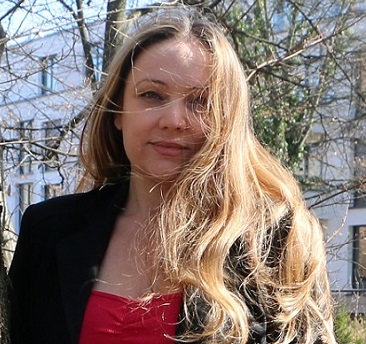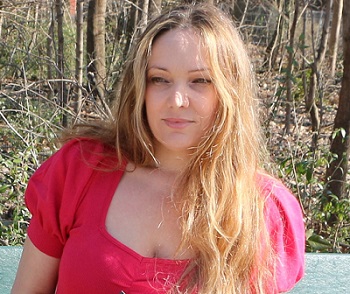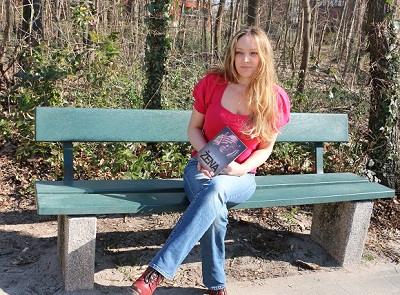
Marijana Dokoza
Marijana Dokoza, poet, author and journalist, will soon publish a poetry book together with the poet J. H. Macado, titled The Offenders, which is especially interesting because J. H. Macado’s poems have been written in response to Marijana Dokoza’s poems. The entire poetry collection is set as a conversation between lovers, but separated lovers whose love is eternal. Like some of the love duets of the opera scene whose beauty is created by a lovely melody and harmony of contrasting voices, the poems in The Offenders are in the harmony of the verses of two different poetic expressions.
Two poems from poetry collection The Offenders have been set to music, and a review for this poetry book was written by popular Croatian singers Željko Bebek, Peter Grašo and Đani Stipaničev.
Marijana Dokoza is the author of five novels, published in German and Croatian and two poetry books: Castle of Secrets and Shadows of the Past. She shares her poetry on Facebook, Instagram and online poetry pages. Josip Horvat Macado known as J.H. Macado has created a huge opus with 3500 poems, published in various literary magazines. He participates at the Rešetari Meeting of Poets and at poetry event Stina pradidova (Great Grandfather Rock).
On the occasion of the forthcoming release of the poetry book The Offenders, I spoke with Marijana Dokoza at the end of February 2022, immediately after her poem I am Hire, Behind You, was set to music by singer and songwriter Myriam Fuchs Kavelj.
Jasna Lovrinčević: “Your new collection of poetry with love poems, created in collaboration with the poet J. H. Macado, is titled The Offenders. The title is associated with something that is not allowed. What is wrong with their activity, with their love?”
Marijana Dokoza: “That title has been suggested by J.H. Macado. It is about the love pain of people who love each other forever. Their love is really eternal, but it cannot become public. They live their love in the present, not looking back to the past and not thinking about the future. Well-known French writer Honoré de Balzac said that love recognized neither the past nor the future but lived in the present.
This is exactly the case with the feelings woven into the poetry of the poetry collection The Offenders. The love of both offenders lives in the present not paying much attention to the past or to the future. They live in the present because it is much easier to live in the present than to think about it what the future will bring or what they experienced in the past. ”
Jasna Lovrincevic: How have you been acquainted with poet J. H. Macado?
Marijana Dokoza: We ‘ve got in touch through social media where we both publish our poetry. We have a similar style of writing and. We immediately recognized each other in poetry. In his poems, Macado, I would say, recounts life and describes love in an old-fashioned way. His poetry reminds me of those old times when one reflected about love, spoke about love in verses, suffered because of love, died, rejoiced, lived for love. It is something as…. when at the end of the day you sit somewhere and look at the horizon and you see a world that already happened but it still waiting for you. That’s how I would describe my feeling when I read Macado’s poetry.
Jasna Lovrincevic: “How have you decided to publish together?”
Marijana Dokoza: “Every word in Macado’s poems has a certain depth asocciated with life but also with death and with that what awaits us after our death. In poetry book The Offenders, the lovers will wait for each other even after death. Macado writes his poetry on the way as it used to be written in the past. His poetry is like some old nineteenth century poetry, it is not dry, it has feelings. Each of his poems is a story. He writes in imperfect tense which is usually not used so often in modern Croatan poetry. I told him that his poetry brings me to the distant past, to different world which can be seen by true romantics. Through our conversation we came up with the idea that he could respond to my poems with his own poems and that it could be like a lovers’s conversation. ”
Jasna Lovrincevic: How do you find Macado’s and your poetry if you compare them, are they contrasting or complementary?
Marijana Dokoza: “My and his poetry is quite similar, that’s why probably we found each other. It seems that we speak the same language. We’ve only met once when the poetry for the book was already written, but we recognize each other as poets very well through poetry. I can’t say if we feel similar through poetry, but we have a similar feeling about poetry.
Jasna Lovrincevic: “Is it recognizable in the poems that it is about a woman and a man, or is the emphasis on love as a universal feeling?”

Marijana Dokoza
Marijana Dokoza: “The poetry book is designed as a conversation between lovers. Like in real life a woman is more sensitive, reacts very quickly to the slightest change, tends to romanticize everything. She feels everything. A man retains a dose of reality that we women often forget. The woman in the book talks about the possibility of the impossible as a kind of limbo, the man primarily talks about desire. The readers can have impression that they read the letters of lovers, or transgressors in love.
Each poem is motivated by another poem. They have a narrative structure, essentially they come out from the heart and need and they open up a number of questions. It is a poetically emotional oasis in which one is easy to meet the needs of the heart. ”
Jasna Lovrincevic: How long have you written the poems for your poetry book?
Marijana Dokoza:”My poems had been created over a period of two to three years before we had an idea to publish a poetry book together. I selected 60 poems for the poetry book. Macado read them and for each of them he wrote his poem as response, like a conversation with me.”
Jasna Lovrincevic: “You said that the poems opened some questions. What kind of questions have arisen from the poems?”
Marijana Dokoza: “Each poem opens up a question about endurance, about needs, about passion, desire, love, readiness for what the life brings to you, it re-examines everything that happens in one impossible love.”
Jasna Lovrincevic: “You have written those love poems for two to three years. Have you considered those poems from beginning as a whole and connected with each other or as individual poem?”
Marijana Dokoza: “No, I always write my poems in a moment. I can’t write a poem if that moment doesn’t come . That momemt belongs to those verses that come out of me. It’s really impossible for me to know when it will happen. Macado has written his poems as a whole, because he already had a part of my poems. He has “entered” into my poems and he has taken from them that the most intimate and has answered on that.”
Jasna Lovrincevic: It means each of your poem is individual? ”
Marijana Dokoza: “Each of my poems is individual but at the end it has happened a whole, something as a story. Probably it’s good that my poems have been created individually and Macado has given them a whole. After all, when you refer to life, at some point someone comes into your life and makes you complete, gives you a whole.”
Jasna Lovrincevic: “Two poems from this poetry book have been set to music by Myriam Kavelj Fuchs and Stella Mcrawli. How is colaboration happened between you and these musicians?”
Marijana Dokoza: “I have collaborated with both musicians through my work as journalist. When the conversation about the songs started, I sent them a few poems regardless of the new poetry book. I have offered them three to four poems and they have chosen the one that impressed them the most.”
Jasna Lovrincevic: “You have written poetry since your primary school. Following your first poetry book published in the year 2000 you were included among the contemporary authors of the Zadar region. Have your changed your attitude to poetry since then?

Marijana Dokoza
Marijana Dokoza: “My attitude to poetry has not changed much. Poetry is always for me the same as it used to be at that early time. Maybe, the only thing that has changed is the expectations of people related to poetry. I have realized, the world that is for me worth to enter into it or just to open it’s door and see what awaits you behind that door, that world does not have to present the same worth for someone else. I mean, I realized poetry is not loved and understood by everyone. Probably it is inappropriately to say, but I think it is good so because it is not necessary that everything should be understood, comprehend and loved by everybody. In some period of time I thought poetry was dying. I wondered how it would survive in a world where it seems that most important thing is to post an attractive photo on social media, to reveal where you are, with who you are and what you do and even what food you eat, to whom you comment, etc.
But I also have realized poetry lives in each person and that comes to the surface from time to time. I think there is no person who at the moment of happiness, sorrow, pain, fear, or uncertainty is not be halted by at least one verse, whether in form of a citat, a lyric set to music,
or a poem.
I am extremely glad that some musicians have accepted to set my poetry to music, because on that way the new life is given to my poetry, but also they have immortalized some of my moments.Thanks to them for that.”
